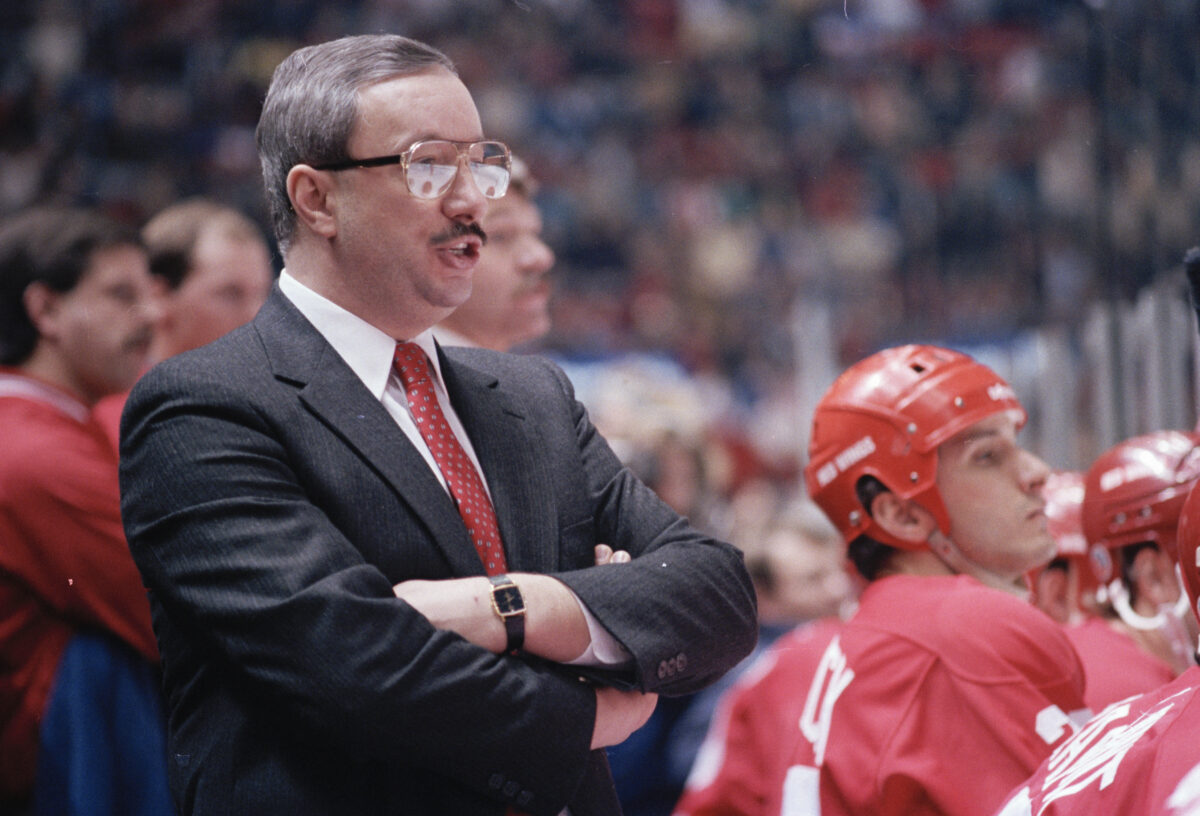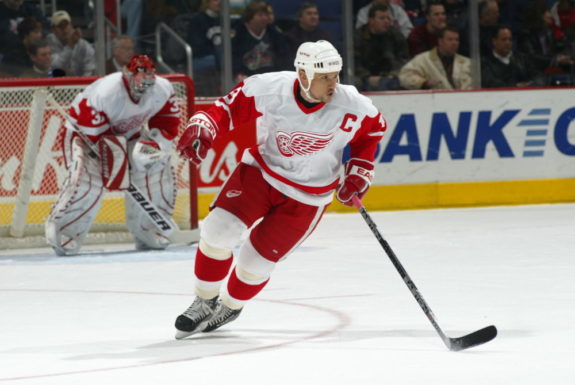The Detroit Red Wings’ hiring of Derek Lalonde as head coach in 2022 brought back memories of 1986 when Detroit was also looking for a coach to help restore a proud franchise. The current version of the Red Wings has some eerily similar characteristics to that group in 1986, with both groups featuring talented young players but also mired in stretches of poor finishes in the standings. Here is a look back at the hiring of coach Jacques Demers and his four-year run that would help restore a winning culture in Detroit.
State of the Red Wings in 1986
The 1985-86 Red Wings began the season with Harry Neale as the head coach. Neale spent seven seasons with the Vancouver Canucks, but his stint in Detroit lasted only 35 games as Detroit had a disastrous start, going 8-23-4, resulting in the firing of Neale before the New Year. Brad Park, who had a Hall of Fame playing career, including two seasons in Detroit, was brought in to coach but didn’t fare much better, going 9-34-2. Park was the sixth head coach of the Red Wings in five years.
The Red Wings had a budding young superstar in Steve Yzerman, who was drafted fourth overall in 1983. He posted 69 goals and 107 assists in his first two seasons, but his third season in 1985-86 was limited to just 51 games due to a broken collarbone. The roster had some talent, including promising young players such as Gerard Gallant, Petr Klima, Shawn Burr, and Adam Oates. There were also a couple of young bruisers in Joe Kocer and Bob Probert who cracked the lineup and brought a needed physical presence to the roster.
Believing in the Impossible
General manager Jim Devellano turned to Demers to be the 20th head coach in Red Wings history. He previously coached for division rival the St. Louis Blues and led the team to the Campbell Conference Final the previous season, losing in seven games to the Calgary Flames. At his press conference, Demers addressed the situation he was inheriting in Detroit. “There are great possibilities here,” Demers said after agreeing to a five-year contract to coach the worst team in the NHL at the time. “There is good talent here, we’re going to do something about it.”

(Photo by Denis Brodeur/NHLI via Getty Images)
“I believe in the Impossible,” Demers said and went on to explain why he believed Detroit could become a winner. “They’ve got a great building, a great locker room, tremendous fan support, and tradition. They had a bad year, and I hope they have a bad summer.” “We will win here,” Demers said, “and it won’t take very long. I’m not talking about five or six years here. I know there’s talent here. What I want to find out is, where’s the character?” When discussing his assessment of the team he was taking over he remarked, “They beat themselves, if we were down, 3-1, we told ourselves just to wait until the last five minutes, they’ll beat themselves.”
Two Magical Seasons
One of his first moves was to name his young superstar Yzerman team captain at the age of 22, a role that he would serve for the next two decades. The Red Wings flourished under Demers’ caring and emotional personality and the on-ice leadership of their new captain. He inherited a franchise known as the Dead Wings and spurned them on to the conference finals for the first time since 1966. He was able to duplicate this feat once again the next season. Demers was the only coach to win two consecutive Jack Adams Awards as the NHL Coach of the Year.

(Photo by Bruce Bennett Studios/Getty Images)
“That was Jacques,” Red Wings assistant general manager Jim Nill said of his former coach. “It came from his heart, and I think that’s where the players wanted to play for him. They knew that he cared that much. It came from his heart, and when you have a person who cares that much, you want to make sure they succeed.”
Related: Red Wings: Comparing Larkin & Yzerman’s First Years as Captain
The fans loved his energy as he would constantly pace back and forth rapidly chewing his gum, and the team assumed his blue-collar style. He would famously get into confrontations between the benches with division rivals John Brophy of Toronto and Herb Brooks in Minnesota.
Goose Loonies Incident and Demers’ Demise in Detroit
The Red Wings were facing the powerhouse Edmonton Oilers in the Campbell Conference Final, which was a series rematch of the previous season. Detroit won Game 3 at home and lost an overtime heartbreaker to Edmonton in Game 4.
The night before Game 5 in Edmonton and their most important game of the season, several players, including Probert, Klima, and Darren Veitch, stayed out late, well past curfew — a curfew that wasn’t being checked because, as Demers would say: “We never ever thought we’d need to enforce curfew when our team reached the final four of hockey.” (from ‘Wings Lost Much More Than a Game,’ Detroit Free Press, Nov 21, 2008) The Red Wings lost that game 8-4.
That incident permanently fractured that team, and Demers would never be able to regain the magic that was provided during his first two seasons. Demers lost the locker room, and the Red Wings would have a disappointing first-round exit in 1989 to Chicago and miss the playoffs entirely in 1990. Team owner Mike Ilitch fired Demers after that season, citing the team was heading in the wrong direction.
While the Demers era in Detroit only lasted four seasons, it was exactly the kind of jump-start a dormant franchise needed at that time. He would move on to become head coach in Montreal and lead them to a Stanley Cup in 1993. Detroit’s work ethic and their standards for success were raised thanks to the Demers years, and seven years later, they would go on to win the Stanley Cup in 1997. Here’s hoping the current Red Wings franchise can find a similar path towards success with their recent hiring of Lalonde.
